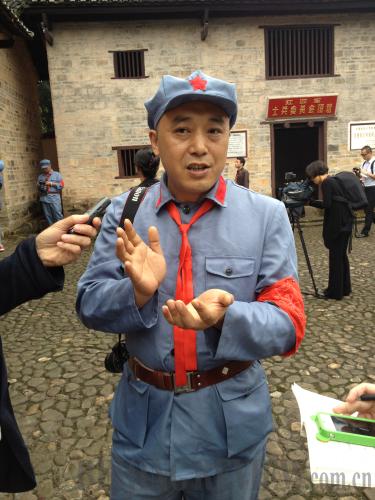|
 |
|
TRAINING TALK: Zhong Ming, an taxation official from southwest China's Chongqing, tells journalists about his training at the China Executive Leadership Academy in Jinggangshan on September 21 (YUAN YUAN) |
In September, Zhong Ming, deputy head of the Local Taxation Bureau of Beibei District in southwest China's Chongqing, spent four engaged days in the China Executive Leadership Academy in Jinggangshan (CELAJ), central China's Jiangxi Province.
The academy, located in a small town, is one of the three national education centers established by the Communist Party of China (CPC) to train cadres, on a variety of topics from history to modern technology. The other centers are located in Yan'an, Shaanxi Province, and Pudong, Shanghai. During his stay, Zhong, together with more than 30 other officials from Chongqing, followed the zigzag pass to the top of the hills of Jinggangshan just as soldiers of the CPC-led Red Army did more than 80 years ago.
"The training is hard," said Zhong, adding that many officials got sore ankles and legs after the long climb. "But it is worthwhile. We heard a lot about the difficult days but it is different when you are right here to experience it. Actually, what we went through in these four days is nothing compared to what they suffered through."
"It's really touching when I hear about harsh conditions of the Party leaders in those days," said Peng Wenyao, an official from the CPC Central Commission for Discipline Inspection. "I am proud of them for achieving so much."
Jinggangshan is the first CPC-led armed revolution base. In March 2005, the CELAJ was established.
"We aim to build up a base for stimulating the Party's tradition in education and a furnace for the officials' capabilities," said Mei Liming, Executive Vice President of the academy, at a press conference on September 21.
Mei said that by the end of August 2012, the academy had held 789 training classes and hosted a total of 39,245 trainees. "It has become one of the new training bases for the Party and played a special role in the cadre training system in China," he said.
There are altogether 87 old revolutionary sites and venues in Jinggangshan, which offer rich training resources. The trainees at the CELAJ are brought in to have classes on site focusing on the history of the CPC.
Yao Yuzhen, 30, has been working in the CELAJ for three years. A graduate of the Capital Normal University in Beijing with a Master's degree, Yao found a job in Beijing but eventually quit and then joined the CELAJ. "My grandfather was a Red Army soldier and my father is a Party member," Yao said. "My grandfather told me many stories about the revolutionary days and they made a big impression on me. I want to have a chance to tell those stories to others." Yao is the youngest teacher at the CELAJ, where she teaches at the Xiaojing Cemetery of Red Army Martyrs.
"Her stories are so touching, I couldn't help my tears," said 40-year-old Wang Baohan, an official from the Department of Land and Resources of the southern island province of Hainan. "It is also very impressive to see people of the young generation like Yao make effort to pass down the tradition of the Party."
Speaking on the significance of the training classes offered by the CELAJ, Wang said that although there are many modern trends of thoughts, the Jinggangshan spirit conceived in arduous struggle should always be cherished as a Party legacy. "In my opinion, the core of the Jinggangshan spirit is persistence," Peng said. "As long as we persist in our faith and work hard, we will create miracles."
| 